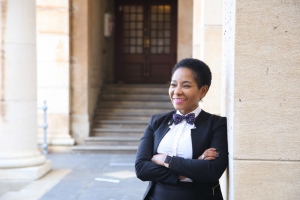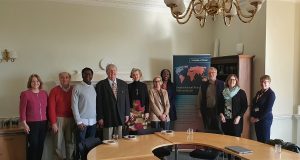On 8th March 2022 Professor Mamokgethi Phakeng, Vice-Chancellor of the University of Cape Town (UCT) and the University of Bristol’s first Bristol Illustrious Visiting Professor (BIVP), gave a fantastic online public lecture on the on multilingualism and social cohesion in South Africa. This talk coincided with International Women’s Day, and was chaired, introduced and supported by women from across academia and professional services at University of Bristol and UCT. A recording of this inspiring and thought-provoking talk is available to view via our website, and we have provided a summary below.
The virtual lecture generated a lot of interest with over 180 people registered from a range of sectors. Whilst the talk itself focussed primarily on South Africa, it attracted attendees from all over the world including Canada, Malaysia, Sri Lanka and Tanzania. We were very pleased to be able to offer South African Language Sign language interpretation throughout the event, which was conducted by Unathi Kave from UCT; we would like to extend our thanks for her services.
The lecture began with Dr Lauren Winch, International Research Partnerships Manager, welcoming everyone and outlining Professor Phakeng’s role as BIVP. Professor Judith Squires, Provost and Deputy Vice-Chancellor, then introduced Professor Phakeng and gave a summary of some of her most recent achievements. You can read her full biography on this webpage.

Professor Phakeng opened her lecture by asking the following question:
” How does it feel when you hear your politicians talk about a progressive language policy that encourages multilingualism, yet when people score below 50% in their matric English they are denied the opportunity of, for example, joining the military despite being fluent in at least six of the 11 official languages spoken in South Africa?’”
Professor Phakeng explained how this is the reality of South Africa’s policies on multilingualism, whilst in other parts of the world are making statements about the importance of policies that recognise multilingualism.
She went on to talk about the perceived advantages of multilingualism in the UK and how in 2019 a group of British university researchers, teachers and politicians issued a statement calling for politicians to issue a statement calling for a comprehensive national policy that would recognise the UK as a multilingual society and to protect the languages of its citizens. They referred to non-English languages as a vital part of the cultural heritage of many British citizens, as well as an asset in developing professional careers. Professor Phakeng noted, however, that whilst these are laudable ambitions, these politicians and academics may not have considered the highly political nature of language.
She explained that in South Africa, whilst indigenous African languages enjoy official status it is English which remains the valued linguistic resource in both education and society, and which is the language of power for social and economic advancement. In the context of her own Vice-Chancellorship, she described language as not just a vehicle to express ideas but also a social and political tool that can be used to act a particular ‘who’ engaged in a particular ‘what’. She described how her identity shifts and takes different shapes as she moves across contexts, citing her experiences as scholar of Mathematics Education, as an executive, as someone who grew up in apartheid South Africa, and being a black, South African woman Vice-Chancellor.
Professor Phakeng went on to outline how any social practice imparts ways of ‘talking’ and ‘seeing’ that are relevant for that practice, and which is a kind of shared knowledge that people need in order to participate in that social practice. As a Vice-Chancellor, for example, one is expected to master the discursive and ideological norms which the academic profession attaches to that subject position, or that Senate attaches to that position.
She explained that for those that are multilingual, decisions about which language to use, how, and for what are always political. She referenced Norman Fairclough, who speaks about institutional and social identities, with institutions imposing upon people ways of talking and seeing as a condition qualifying them to act as subjects.

Professor Phakeng then moved on to exploring language policy approaches. She explained how there have been multiple language policy frameworks developed in education in South Africa since 1994 when the democratic South African government came to power. The main purpose of these is to ensure the development and strengthening of indigenous languages, as languages of scholarship, teaching and learning and communication.
She noted that in 1997 South Africa announced a new language education policy that recognises 11 official languages, nine of which are indigenous, giving schools and learners the choice of language to learn and teach in. She explained that whilst this policy is seen as widely inclusive and good the reality is that on the ground it’s meeting significant constraints. Research suggests that most schools are not opting to use indigenous African languages due to historical connections with apartheid and inferior education and the perception that English remains the gateway to better prospects.
Professor Phakeng expanded on the reality of the multilingualism policies, noting that English is currently the pre-requisite language for anyone wanting to become a professional in South Africa. English language skills remain the most important criterion for the selection of high-ranking officials, and knowledge of an indigenous African language is seen as an asset rather than a pre-requisite. The same is also true for students. Most policy documents are also written in English, and whilst some may be translated into Afrikaans but unlikely to be available in any of the indigenous languages.
South Africa is therefore a multilingual country with multilingual policies, but with monolingual practices.
“What would I do if I had the power to tell the country this is the way to go?”
In conclusion, and building on the context provided throughout her talk, Professor Phakeng then outlined her five recommendations for enhancing the status of previously marginalised South African languages:
- Everyone who lives in South Africa should learn at least one of the nine indigenous languages.
- It should be a requirement that a learner must pass at least one indigenous language as a subject.
- Every South African University should adopt one of the nine indigenous languages as an additional language for all students and staff to learn, and that the value of this should be recognised with associated course credits and remuneration respectively.
- Fluency in one of the nine indigenous languages should be recognised an added advantage for anyone seeking employment, and this should be remunerated appropriately.
- African languages should be taught in their own language, not in English which is the current practice in some universities in South Africa.
Professor Phakeng explained how these changes would raise the value of indigenous languages and endow them with more power. She emphasised the importance of these recommendations in enabling South Africans to develop the language skills required in order to communicate with a much wider and more diverse audience, and noted that having shared language can help towards social cohesion and ease tensions.
One of the reasons for polarisation in South Africa is because people do not talk as much as they should, and it is the marginalised that have to talk in English – often an unfamiliar language – in order to be included and to be heard. Professor Phakeng is keen to move towards a more inclusive, equitable, cohesive society, and thinks language policy could be a key route to achieving this. As a closing remark she invited others to reflect on this, both for South Africa and for other multilingual contexts.
Following the presentation we had a fantastic Q&A, with questions submitted by the webinar audience. This event was chaired by Dr Angeline Barrett, a Reader in Education at the University of Bristol. Dr Barrett, in collaboration with researchers and teacher education in Tanzania has developed a language support pedagogy for learners entering English medium secondary education after their primary education in Swahili. The approach that herself and colleagues used builds upon work by Professor Phakeng from earlier in her career on language in mathematics classrooms as well as other world leading research on multilingual education conducted by South African researchers.
Through the questions, Mamokgethi reflected on a range of topics including:
- Standard and non-standard language use in scholarship
- Language as a powerful tool politically but also in bringing people together as well as creating access
- Visual literacy
- Khoi and San as non-official / official languages
- What South African languages can teach those outside of South Africa
- Indigenous language representation in South African media
- Debates around learning in a language
- Dominance of different South African indigenous languages
The event closed with some final remarks from the International Research Partnerships Manager, Dr Lauren Winch, thanking everyone for their contributions and reminding attendees that the recording will be available via the University of Bristol’s International Research Partnerships website.
This was the second event that Professor Phakeng has participated in since her Bristol Illustrious Visiting Professorship (BIVP) launched in October 2021. The recording of her launch event, featuring University of Bristol’s Vice Chancellor and Deputy Vice Chancellor and Provost alongside Professor Phakeng can be accessed via our website.



